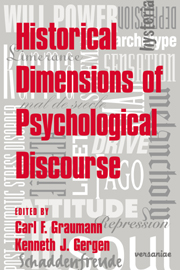Book contents
- Frontmatter
- Contents
- List of contributors
- 1 Psychological discourse in historical context: An introduction
- Part I Disciplining psychological discourse
- Part II History as culture critique
- Part III Early antecedents
- 9 The naturalized female intellect
- 10 Sources of redemption in psychoanalytic developmental psychology
- 11 The historical vicissitudes of mental diseases: Their character and treatment
- 12 Women as mothers and the making of the European mind
- Part IV Lived history
- Author index
- Subject index
9 - The naturalized female intellect
Published online by Cambridge University Press: 20 October 2009
- Frontmatter
- Contents
- List of contributors
- 1 Psychological discourse in historical context: An introduction
- Part I Disciplining psychological discourse
- Part II History as culture critique
- Part III Early antecedents
- 9 The naturalized female intellect
- 10 Sources of redemption in psychoanalytic developmental psychology
- 11 The historical vicissitudes of mental diseases: Their character and treatment
- 12 Women as mothers and the making of the European mind
- Part IV Lived history
- Author index
- Subject index
Summary
Introduction
It was predestined that the history of gender and the history of science and medicine would converge, for they share a central preoccupation with the understanding and uses of nature. They also share a framework for analyzing conceptions of nature and their applications, that of naturalization. Reduced to its essentials, “naturalization” refers to ways of fortifying various social, cultural, political, or economic conventions by presenting them as part of the natural order. Naturalization is a leitmotif of gender studies, many of which show how forgers and enforcers of gender identities have appealed ceaselessly to the authority of nature, and how the interpreters of nature – natural philosophers, natural scientists, and physicians – have often aided and abetted that transfer of authority. In the context-dominated science studies of the last decade, naturalization has been the bridge carrying the heaviest traffic between science and its social context: Galileo, for example, “naturalizes” the shaky political legitimacy of the Medicis by christening the newly discovered moons of Jupiter in their honor; Darwin “naturalizes” the contested theories and practices of British political economy in the theory of natural selection. In both gender and science studies, naturalization is ideology at full strength, hardening the flimsy conventions of culture into the immutable, inevitable, and indifferent dictates of nature.
In this essay, I would like to use the history of early modern conceptions of the female intellect to challenge the notion of naturalization as it is currently deployed in both gender and science studies.
- Type
- Chapter
- Information
- Historical Dimensions of Psychological Discourse , pp. 165 - 192Publisher: Cambridge University PressPrint publication year: 1996
- 2
- Cited by

